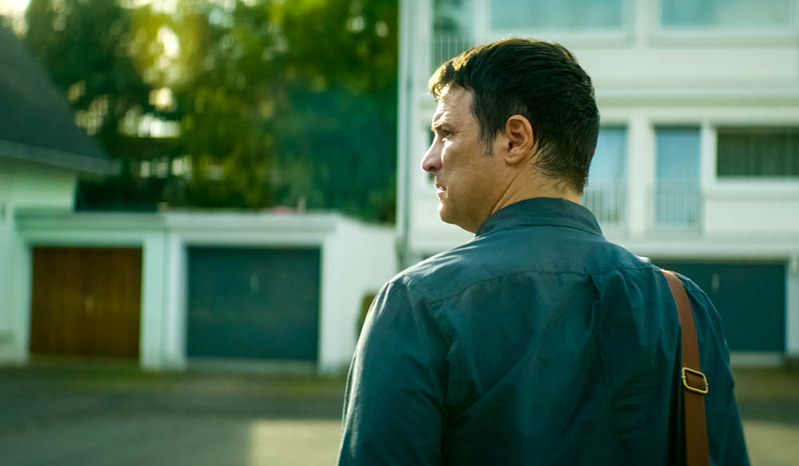From Germany, writer/director Visar Morina’s “Exil” is a quietly nightmarish character study about the daily paranoia of being intentionally left out—something that everyone experiences, but very few people dare make movies about. With an extremely tempered performance from Mišel Matičević the film puts those feelings under a microscope, and turns all of those moments of sitting with your thoughts and uncertainty about what’s really going on into austere unease. It’s the kind of thriller that Michael Haneke would make after learning he didn’t get invited to a friend’s party, and Morina’s film builds from that influence with his own audacious visual storytelling.
Matičević plays Xhafer, an Albanian husband and father from Kosovo, who works as a chemical engineer for a company in Germany. From the opening scene, in which he encounters a dead rat on his door (and Xhafer, we learn, HATES rats), Xhafer feels like he has some type of target on his back. His workplace makes things worse, like when he gets left off a company mailing list, and when his colleagues will not share information with him that he needs to do his job. He talks to his wife Nora (Sandra Hüller) about the way he’s treated differently, and underestimated by his colleagues who sometimes ask him to repeat his last name over and over. In the film’s slow burn, Matičević eventually starts to act out against his employees and Nora, but the performance maintains tense—his mouth always making a straight line that rarely breaks.
One of the film’s most disturbing scenes involves Xhafer getting singled out during a big company meeting, in which they talk about diversity. After a figurehead specifically mentions Xhafer, they end their speech, and a slow applause takes over. They continue clapping, and then they stand up, with Xhafer trapped in his seat and the clapping getting louder and louder. Eventually their claps achieve a bizarre syncopation, which matches how composer Benedickt Schiefer uses aggressive hammering in his score for other scenes when Xhafer is sitting in silence with his uncertainty. It’s a claustrophobic scene without being in-your-face, and it does not matter whether it’s actually some daydream or not—it fits within the rich tone Morina has constructed.
Morina has crafted a script that seemingly lives on the edge of being completely mundane, but his filmmaking leads with its exhilarating confidence, and assured vision. The film feels full even when it’s mostly about showing his growing paranoia, and giving him bits of reality right when he thinks it’s getting worse. Without such a total and tempered vision that Morina clearly has for this projects, one can easily imagine it flattening out. Instead, it goes from one carefully composed scene to the next, where a dynamic use of shadows, negative space, and blocking slightly elevate the style, but keep us in tune with the Xhafer’s internal horror. Morina’s audacious story finds a perfect visual match, and “Exil” flourishes in the thick grey area of whether Xhafer is experiencing all of this intentional bias, or not.

Also playing in the World Dramatic Competition, “Jumbo” boasts a bizarre coming-of-age romance between woman and amusement park ride. While it very well be the strangest love story to play in Park City this year, “Jumbo” proves to have a quirky, impossible concept where its heart should be.
But not that it doesn’t try, as with Noémie Merlant’s full-bodied, heavily emotional performance as the smitten Jeanne. She’s an amusement park employee who has a creativity that’s noted by all the different wire sculptures in her room, and has a grace when it comes to touching inanimate objects. One night, she gets close to the new attraction, and feels a connection that she can’t resist. Writer/director Zoé Wittock’s script is a little slight with Jeanne’s psychological background, but it plays these beats seriously, and as part of a larger life story.
Jumbo comes alive to Jeanne (and the viewer, to some extent) as this massive colorful claw with seats, who whirrs like a Transformer and gives Jeanne a Spielberg-like awe when she first stands below him, looking up. (She also genders the amusement park ride.) In scenes that show how serious the movie is about creating this great love for Merlant’s character, she builds a tenderness with each touch of it (caressing its light bulbs), and later fulfills a sexual appetite. The film straddles a sense of dreaminess, but also that it’s watching a woman get on an amusement park ride and have an orgasm.
“Jumbo” expands this story beyond this relationship, and it’s better as a story about how this major love affair makes for an even bigger rift between Jeanne and her mother Margarette (Emmanuelle Bercot). Her mother tries to set her up with amusement park boss Marc (Bastien Bouillon), and is clearly more comfortable with sexuality than her daughter. But the two share a few bruising scenes where Margarette just can’t accept what her daughter is feeling, especially as it brings up fear about how Jeanne has long left normalcy. Even if the scenes still leave the viewer cold, it does give them concrete emotional work. If they can do this kind of heavyweight stuff with an amusement park ride, just imagine what else they can do.
For a movie like “Jumbo,” it feels almost better to go even crazier, especially for a story that wants to encourage people to love what and whoever they love. But “Jumbo” takes itself distinctly more serious than that—as if it has a soft spot itself for the amusement park ride—and it makes for a romance in which you don’t care much for the main guy. You can see the effect he has on the woman, and while you don’t laugh at her big emotions for an amusement park ride, you never feel what she does.












